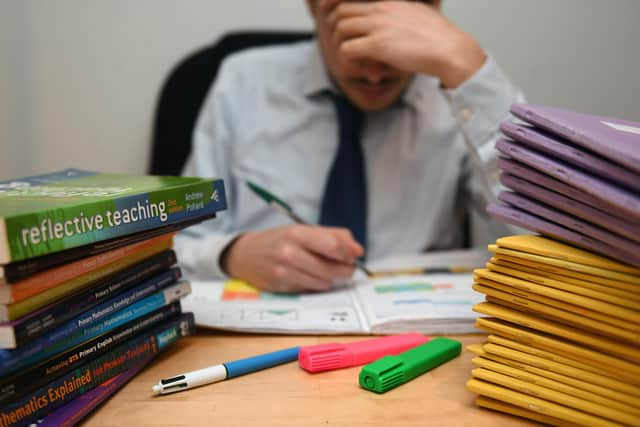So what happens in Scottish schools after OECD report? - Cameron Wyllie
It’s to the credit of the new education secretary Shirley-Anne Somerville that she has immediately accepted the recommendations of the report in full and moved to implement some of its key ideas.
As the summer holidays bring an end to the weary, endless days of pandemic education, it’s my guess that teachers will be pleased, if unsurprised, by the report – they’ve known what the problems were with CfE all along – and they will be wondering what, if any, real impact all this action might have on their actual classrooms come the start of the new school session and beyond.
Advertisement
Hide AdAdvertisement
Hide Ad

Many will suspect the future holds the same old problems. Breaths will not be being held.
There is hope, though.
The abolition of the SQA which has been limping along for a decade, plus the re-establishment of the Inspectorate as a separate body, means there is potential to create a body that, with some logic, will be responsible for the curriculum and for the assessment of that curriculum.
When this new organisation is created it is very difficult indeed to see what the function of the quango known as ‘Education Scotland’ will be (actually, most teachers would have some difficulty explaining what it’s ever been).
The newly-liberated inspectors will, I hope, feel that it’s their job to scrutinise, constructively, but honestly, the state not just of individual schools but of the entire sector.
Then some kind of decision needs to be made about the ‘senior phase’ – the exam years of secondary education.
The OECD’s criticism was that the exams do not articulate with the broader aims of CfE. That is absolutely correct, but I really hope that the chosen solution is simply to halt CfE at the end of S2 and ensure that the focus of these last four years shifts very strongly to ‘successful learning’.
It is extremely difficult to see how the other ‘capacities’ of CfE can reasonably be assessed and it is questionable whether that’s desirable anyway.
Stopping the CfE approach at the end of S2 will prevent the continuing slide of Scotland’s international educational scores, particularly in the crucial areas of maths and science, and it’ll get rid of the questionable continuation of ‘Broad General Education’ into S3.
Advertisement
Hide AdAdvertisement
Hide AdI suggest that before our new educational leaders peer into the abyss of abolishing the traditional Scottish exams – there’s a reason why the cliché ‘gold standard’ is applied to the Highers – they talk to teachers, parents, pupils, employers and the universities, lest some warped form of educational idealism throws the exam baby out with the bathwater.
Shirley-Anne Somerville has also indicated a willingness to move on the issue of teachers’ working hours – the report found that Scottish teachers spend much more time in the classroom actively teaching young people than happens in the vast majority of other developed nations.
This will require the recruitment of thousands of new teachers – many more than the 3,500 promised in the SNP’s manifesto – and will thus cost a great deal of money, even if there are considerable savings to be made from the reform of Education Scotland and the SQA.
My concern is not about the Scottish Government’s willingness to do this, but about where exactly these teachers – particularly in STEM subjects – are to come from.
If this is going to happen, it’s going to need a brave approach, not just to teachers’ classroom contact, but to their pay.
Both new recruits and experienced classroom practitioners need to be paid more, then need, as the report stressed, much more time to collaborate and prepare the high-quality lessons our young people deserve.
Scottish teachers are exhausted, with many ready to depart the profession and others off with stress. OK, this has been exacerbated by Covid, but it’s not a new phenomenon and this is a real opportunity to get things right.
So, the SNP Government has responded quickly and robustly; they haven’t lied or faffed about; they propose massive changes to the way Scottish education is run.
Advertisement
Hide AdAdvertisement
Hide AdThey need to prove to young people, parents and teachers that this will all have a direct effect on the education of every young person.
Let’s not look back in 20 years and wonder why everything just remained the same after all.
- Cameron Wyllie, a former headteacher, publishes a blog called A House in Joppa
Comments
Want to join the conversation? Please or to comment on this article.
